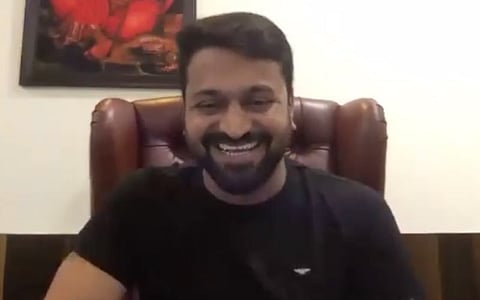
- Reviews
- Power List 2024
- Cannes 2024
- In-Depth Stories
- Web Stories
- News
- FC Lists
- Interviews
- Features
- FC SpecialsFC Specials

From writing a movie after learning about the restrictions the COVID-19 pandemic brought with it to the drug scandal that has rocked the Kannada film industry, Rishab Shetty shares his thoughts on varied issues. Excerpts from his conversation with Kairam Vaashi, where he also speaks about producing parallel films and starring in action comedies.
When the entire industry is reeling because of COVID-19, social distancing, lockdown and other such problems, you've gone ahead and shot a film [Hero]. Is this fair? (laughs)
[Laughs] It is totally justifiable because I didn't want any more injustice to prevail. Moreover, people might end up thinking I only release posters and make announcements, and nothing beyond that. I was about to shoot for Nathuram, but there was an issue with the script. We thought we'd work on it for some more time, and postponed it. We released the poster for Garuda Gamana Vrishabha Vahana after we completed the shoot. It was supposed to release in June. Garuda Gamana… is a big film. Hence, we're waiting for theatres to open.
That's when I started thinking… and I had three bound scripts — Rudraprayag, Laughing Buddha and Hari Kathe Alla Giri Kathe. I spent time with my wife and son in my hometown for two months. When the first lockdown ended, I came to Bengaluru, but the cases started going up here. So, we couldn't shoot. That's when an idea hit me one evening. I pitched the movie, with a handful of characters and limited run time, to my team. Even if it did not reach an OTT platform, we thought we could still make it available for audiences somehow.
We weren't sure about when the pandemic would end. That's why Pramod [actor Pramod Shetty] and I came up with a set of guidelines to shoot, even before the government released the official rules. We took some precautions and went into production after taking a week for writing the script and another week for pre-production.
You made your film with restrictions even though you wanted your film to look like it wasn't shot during COVID. What were the challenges that you faced? And what did you learn from them?
For a film like Kirik Party, you'd need 80 to 100 crew members. You'd need at least four to five people to handle the camera equipment. When Pramod and I discussed this, we got to a point where we considered people who could take up four different jobs, like working in the art department and act.
We took inspiration from Shankar Anna [Shankar Nag]. I phoned Ugramm Manju and asked him if he had been going out regularly. He said there were little kids and old people in his house, and so he did not go anywhere. I said, 'Very good, I'll call you tomorrow. Wait for my call.' We called up people who could multitask. We chose the best technicians who hadn't stepped out for a while. We ruled out COVID that way. We could not bring in people from other cities, so we picked most of the members from Bengaluru. And, for the rest, I called people from my hometown as the location was a forest. We needed a few people who knew the forest area well. So, the crew has a mix of both.
Without getting into details, do you think the industry has got a bad name due to the drug scandal? Many parents, for instance, are okay with their children dabbling in theatre, but not films.
Parents weren't sending their children to theatre, too, earlier. It was the same with films. Women who worked in movies were shunned by their family. Many artistes have faced this in the past. But things aren't the same anymore. Also, we've been hearing about the drug scandal for a long time. Can the media houses that are highlighting some names reverse the damage they've been doing to the celebrities after the investigation comes to an end?
When a name comes up during investigation, the media hypes it. But when the same celebrity is cleared, the media won't talk about it. Maybe, because of this, some women and men might be afraid of entering the film industry. But that's just one side of the story. This happens in all industries, and there are good and bad people everywhere. When it comes to the movie industry, there's more attention. News from here reaches the public sooner than in other industries.